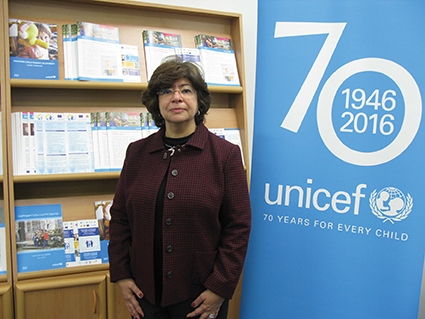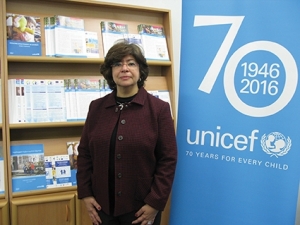INTERVIEW: Laila Omar Gad, UNICEF Representative to Georgia
UNICEF Georgia has been an active contributor to the recent celebration of the organization’s 70th anniversary and this week organized a Welfare Monitoring Study presented at Holiday Inn Tbilisi and a discussion on social issues in Georgian Art held at the Writer’s House.
Joining the world’s most well-known contemporary writers in a global literary campaign of “tiny stories” to advocate neglected children’s rights all over the world were many Georgian authors including: Paata Shamugia, Irakli Kakabadze, David Gabunia, Shota Iatashvili, Nestan Kvinikadze, George Lobzhanidze, Vasil Guleuri, Diana Anfimiadi, George Kekelidze, Rati Amaglobeli, and Lia Likokeli .
GEORGIA TODAY spoke with Laila Omar Gad, UNICEF’s newly appointed Representative to Georgia, on the recent Welfare Monitoring Survey, its findings and recommendations.
What are your impressions since you came to Georgia?
I’ve enjoyed every minute since I arrived at the beginning of September. Before Georgia I was in Kosovo and I chose to take up my next posting here. It is a very rich country in a cultural sense. It’s also a country that has gone through a lot. Georgia has a clear identity and great aspirations towards joining the EU, and working in such an environment is thrilling. There’s openness in addressing challenges and Georgia has made progress in many areas, but there are still many challenges, particularly in children and adolescent rights.
What challenges do you face in your day-to-day work?
I’ve found that the legislation in Georgia is up-to-date, but there are challenges in implementation. There is a difference between Tbilisi and municipalities, specifically in capacity and budgets. This leads to gaps in implementation – particularly in areas such as preschool education and health, decentralized and dependent on municipalities in charge of implementation with very limited resources. It is essential to build municipal capacity and increase budget at the municipal level to improve outcomes for children. Another important area is that of data. While there is progress in the data available on children and adolescent rights, the full picture is still unclear, and the area of child and adolescent rights is still lacking data. For example, while Georgia is a signatory to the Convention on the Rights of Persons with Disability and the Convention on the Rights of the Child, data on child disability is limited, as is data on violence against children. One of our priorities while working with the Government of Georgia (GoG) is strengthening data that will help us raise awareness of the situation of children – of all children in Georgia, and establish mechanisms for the government to monitor the situation and the progress of the implementation of the various strategies that exist here.
Tell us about UNICEF Georgia’s Welfare Monitoring Survey and its key findings
Georgia has succeeded in reducing the poverty rate, particularly for children, with the reform scheme of targeted social assistance. This was picked up by the Welfare Monitoring Survey. It was set up in 2009 to measure the impact of the world financial crisis of 2008 on Georgian households. UNICEF wanted to estimate the prevalence of poverty during that time. Since 2009, the survey has been conducted every two years to monitor the trends in poverty and wellbeing of the population. It is a unique survey because it is a panel survey, which means the same households are visited for each round of the survey, which gives a good timeline and the chance to measure the impact of economic development. The most recent survey was conducted in 2015 and the findings were presented this week. While the latest survey indicated a reduction in child poverty, it highlighted that there’s still much to be done. It showed that despite the improvement, one child in five is still living in poverty and one child in six still lives in a family that cannot afford the minimum subsistence level. The survey also demonstrated that children who are living in poverty are also very susceptible to other deprivations and risks; are more likely to have poorer health outcomes and are more likely to either not be enrolled at all in preschool education or drop out of school at the age of 15-16. The wealth of Georgia is its people and Georgia needs to recognize that children are the future of Georgia.
What are the major recommendations of the survey?
The social protection system needs to be examined so that it can capture many of the poor who are not part of the existing social protection schemes. We need to recognize that the targeted social assistance scheme is designed to address long-term poverty and those population groups living in chronic poverty. The case is different for households that are subject to shocks which make them susceptible to fall into poverty (such as long-term illness, death of the main breadwinner, or unemployment) as there is no protection mechanism for them. Young people are at particular risk, those who are unemployed and those who have no means to protect themselves from external shocks. Another important recommendation is to develop a multi-sectorial child rights strategy, given the existing multiple and overlapping deprivations that affect children in Georgia. Investing more in the social protection system, in preschool education and in improving the quality of education is crucial. In addition to better monitoring of the existing social protection schemes and to designing an overall strategy, there is a need to put children at the heart of budgets. UNICEF global studies reveal that for every single dollar spent today invested in children, this triples the returns in the future. It is a long-term investment that assures greater returns economically, socially, and financially. Georgia invested just an additional 5 percent in the targeted social assistance scheme and with that 5 percent was able to capture 30 percent more of the most vulnerable families…. continuing to invest means that we also examine ways to make it more cost effective.
Tell us about the Child Wellbeing Card
The Child Wellbeing Card is an attempt to monitor the wellbeing of children through a number of key indicators that enable us to regularly monitor and give a picture of where Georgia stands in terms of realization of children’s rights. And there are sets of indicators that are internationally comparable so that Georgia can be compared to other countries. They represent a number of key priorities for progress in children’s rights in Georgia, including poverty, health, early childhood development, early childhood education, dropouts, violence against children, and children with disabilities. The child wellbeing report card is now in the process of finalization with our partners. We can already see that while Georgia has reduced maternal mortality rates, they are still high, particularly when compared to other countries in the region. This is particularly concerning as these maternal deaths are preventable. The same goes for under five mortality in children in Georgia, with the rate twice the average of Europe. That’s why we want to make children’s issues visible and monitor the progress in realization of children’s rights in all accountable institutions for children’s rights. A key to success is the partnerships we have with the GoG, our international partners and civil society organizations. We work hand-in-hand as partners and have a common goal, a common vision, and agree on the steps needed to realize the rights of every child in Georgia – leaving no one behind.
What would you like to achieve as a representative of UNICEF to Georgia?
The experience of UNICEF in recent years has demonstrated that you can’t say “I’ve done the work, so I’m leaving now.” With the migrant and refugee crisis affecting Europe, UNICEF is establishing liaison offices in Italy, and Greece, for example, to support the governments of these countries to strengthen the systems for child protection in view of the refugee and migrant crisis. I would say it’s about being relevant, as long as we’re relevant, we’ll work. For me, the priorities are to continue working on the successful collaboration between the Government of Georgia and UNICEF to promote that rights of all children and adolescents in Georgia.
Nino Gugunishvili












